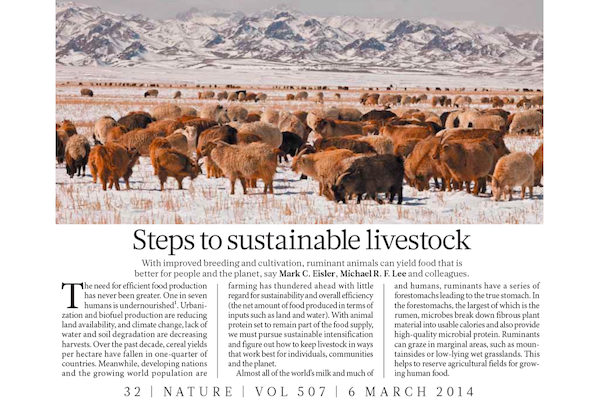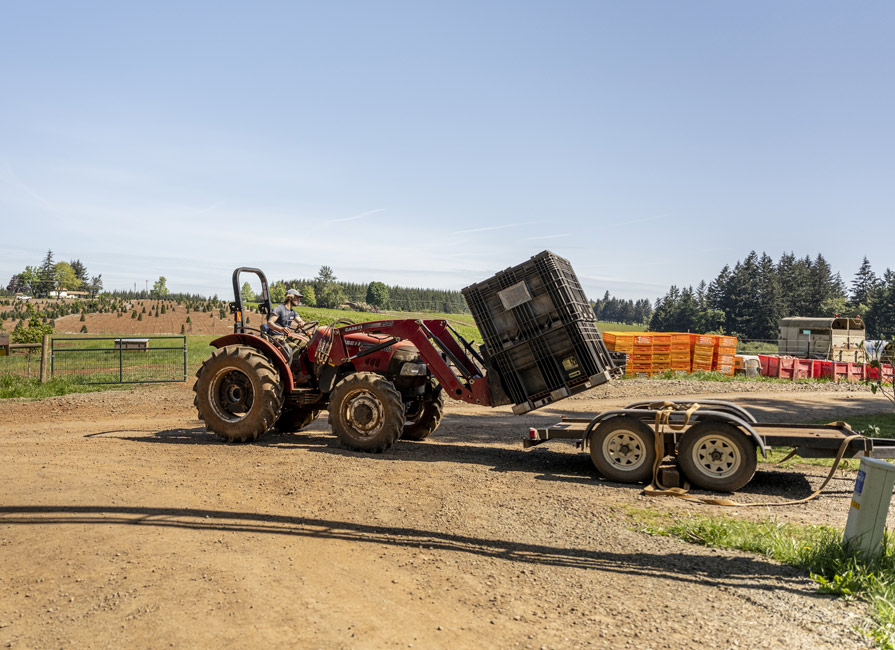One of the key attractions of our Certified Regenerative by AGW program is its practical…

Sustainability is Complex: There is No Single Diet Solution
We face huge challenges in feeding the world sustainably. But one thing is certain: Grazing ruminant livestock—and the high-quality food they produce—can and should play a key role.
With ongoing reports and media headlines about the negative impacts of livestock—particularly beef cattle—on the environment and our health, this might seem like an unscientific statement. After all, livestock are now widely considered to be unsustainable. So it might come as a surprise to know this support for grazing ruminants was one of the key conclusions from the first International Conference on Steps to Sustainable Livestock—a ground-breaking multi-disciplinary event involving leading scientists working to find solutions for global food security, hosted by the Global Farm Platform and University of Bristol Cabot Institute in Bristol, UK, on January 12-15, 2016.
Over the three-day conference, 50+ scientists presented the stark realities of industrial livestock production and the challenges we face in feeding the world: The significant direct and indirect greenhouse gas (GHG) emissions; the widespread erosion and degradation of soils; the localized environmental pollution from concentrated output of fecal waste; and the human health threats posed by widespread farm antibiotic abuse. The list goes on. With the ever-increasing demand for meat and livestock products from a rising global population, it’s easy to think that ending all forms of livestock production—and adopting a plant-based diet—is the only answer. But it’s not.
We’ve said it many times before, but the scientific evidence presented at the Steps to Sustainable Livestock conference confirmed that grazing ruminant systems (in other words, managing cattle, sheep, goats and bison on pasture) can not only help feed the world sustainably, but also provide a number of important environmental and societal benefits.
Perhaps the most immediate take away from the Steps to Sustainable Livestock conference was that industrial grain-based livestock production is simply no longer justifiable—and may even be morally suspect. With over 800 million people on this planet going to bed hungry, and more mouths to feed every day, there was a near unanimous agreement at the conference that governments urgently need to pursue a ‘food not feed’ strategy, reserving prime agricultural land for growing human food—not livestock feed. Livestock currently consume around 70 percent of grains used by developed countries, and a staggering one-third (or 795 million tons) of all grain grown in the world, meaning that industrially raised grainfed animals are competing directly with hungry human beings for food. The very same concerns apply to the policy of using prime agricultural land to grow crops for biofuel.
Underpinning the Steps to Sustainable Livestock conference is the knowledge that ruminant animals have evolved the unique ability to convert high-cellulose plant materials (read grass and forage) that humans cannot eat into high quality meat and milk that we can, thereby allowing us to produce food from marginal land we could not otherwise use to grow crops. But the benefits of grazing ruminants do not end at utilizing vast areas of marginal land to produce much-needed food.
Grazing livestock are also a vitally important source of high-quality, protein-rich and nutrient-dense food. While no one can deny the excessive global consumption of industrially produced grainfed meat is simply unsustainable (not to mention bad for our health), researchers at the Steps to Sustainable Livestock conference praised the “extraordinary merits” of animal-sourced foods, arguing that modest quantities of high-quality pastured meat and dairy products (as part of a balanced diet) offer significant health benefits, providing a vital source of lean protein, healthy fats–such as omega-3s and CLAs—plus a smorgasbord of micronutrients essential for health, such as iron, magnesium and selenium. Changes in animal food consumption patterns have already had notable health impacts, with one researcher suggesting that a diet lacking the key micronutrients found in plentiful supply in livestock products (and milk) is resulting in serious emerging health problems—even in high-income countries.
We learned that grazing livestock systems result in many environmental positives—from improved biodiversity (above and below the ground) to the role of well-managed pasture and grassland as carbon sinks. While it is true that grazing ruminants produce significant levels of methane, researchers at the Steps to Sustainable Livestock conference argued that we must stop comparing livestock systems on methane emissions alone. Instead, we need to consider all GHG emissions and environmental impacts associated with all stages of any given production system—including the potential for well-managed grazed pasture to sequester significant levels of atmospheric carbon dioxide. New research is already investigating the potential of alternative livestock diets to significantly reduce the amount of methane emitted, including new plant varieties and dietary supplements, while new livestock breeding strategies utilizing geonomics (not genetic engineering) can also aid the selection for positive methane emission traits. Potential solutions are emerging fast but we urgently need more research and support to encourage adoption of such practices at the farm and policy level.
Reflecting the multi-disciplinary and holistic nature of the conference, we were also reminded that animal health and welfare is directly related to our future food security. While welfare concerns might seem secondary to matters like maximizing animal productivity to feed a growing global population, researchers pointed out that healthy animals are productive animals and produce healthy, nutritious food. Conversely, unhealthy animals are not only less productive (and inevitably require routine drugs like antibiotics to maintain productivity), but can present a real disease risk to humans—as we are now learning at great societal cost.
The quest for sustainable food production is highly complex and there will be no one-size-fits-all solution. Indeed, the necessary solutions will inevitably be highly complex, multi-faceted and site-specific: it comes down not simply to what you eat, but fundamentally how it is farmed. There is no single diet solution for everyone, and consuming nutritionally appropriate levels of pasture-raised livestock products as part of a healthy, balanced diet with plenty of sustainably produced vegetables and fruits is not just an acceptable option, it’s a vital one. And while developed nations urgently need to reduce the production and consumption of unsustainable, low-welfare, intensively raised livestock products and highly processed foods (there’s a good chance many of us would feel a lot better for it), it is clear from current science that pasture-based livestock systems will not only continue to supply high-quality, nutritious food to global populations, but can help protect and enhance key ecosystem services and mitigate anthropocentric GHG emissions.
The International Conference on Steps to Sustainable Livestock marks a very important step towards sharing best practice on optimizing the sustainable use of livestock in many regions of the world, and challenging the industrial farming paradigm. As an organization that supports sustainable livestock farmers, it was refreshing and reassuring to hear that leading scientists from across the world believe that sustainably managed livestock have an important role to play in feeding the world, and to know that AWA’s farm standards already represent among the most sustainable methods available.
Read the original collaborative article, published in Nature Journal in 2014, that spawned the Global Farm Platform—and subsequently the recent International Conference on Steps to Sustainable Livestock.
About the Global Farm Platform
The Global Farm Platform partnership brings together the University of Alberta (Canada), the University of Bristol (UK), the CGIAR International Centre for Tropical Agriculture (CIAT), Kansas State University (USA), Kerala Veterinary and Animal Science University (India), the Instituto National de Investigación Agropecuaria (INIA, Uruguay), The University of Leeds (UK), Massey University (New Zealand), Penn State University (USA), Rothamsted Research (UK), the Small Scale Livestock and Livelihoods Programme (Malawi), the University of Sydney (Australia), the University of Western Australia, the University of Wisconsin-Madison (USA) and Zhejiang University (China). The key partners already have a strong history of working together, and are each linked to a number of relevant institutions that will make further valuable contributions to the Global Farm Platform.
About Cabot Institute
The Cabot Institute carries out fundamental and responsive research on risks and uncertainties in a changing environment. We drive new research in the interconnected areas of climate change, natural hazards, water and food security, low carbon energy, and future cities. Our research fuses rigorous statistical and numerical modelling with a deep understanding of social, environmental and engineered systems–past, present and future. We seek to engage wider society by listening to, exploring with, and challenging our stakeholders to develop a shared response to 21st century challenges.


